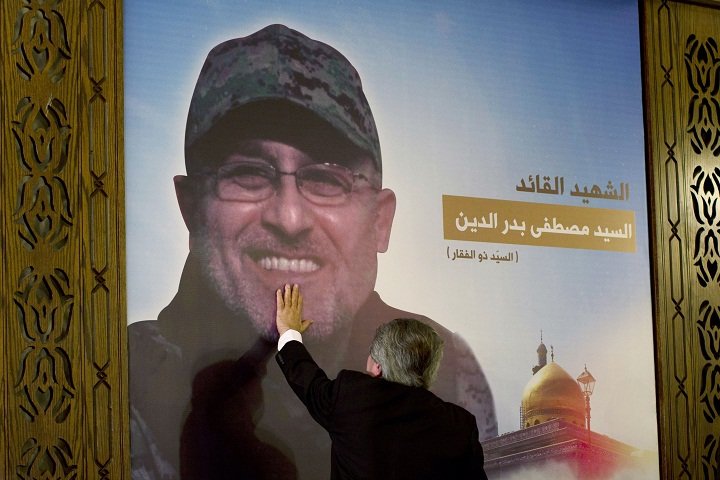By Marwa Osman*
Hezbollah has lost one of its elite commanders not only at the military fronts, but also at the intellectual and educational fronts. Mustafa Amin Badreddine, Sayyed Zulfikar, was martyred in a large explosion in Damascus, Syria, stealing away the most prominent military leader in the Lebanese Islamic Resistance Hezbollah.
Sayyed Zulfikar, 55, was the most senior Hezbollah member to have been killed since his predecessor and brother-in-law Imad Mughniyeh was assassinated in Damascus in February 2008 in a joint Mossad and CIA operation. Since then Badreddine had led all aspects of the Resistance’s activities, including the war in Syria, in which Hezbollah became a major player in 2012 fighting back wahhabi-inspired takfiri terrorists.
Hezbollah announced on Friday May 13 the martyrdom of the senior commander in a statement saying that a huge blast hit one of the resistance centers near Damascus airport. After an investigation took place in order to verify whether the blast was a result of an airstrike or shelling, another statement was released confirming that the explosion “which targeted one of our positions near the Damascus International Airport and led to the martyrdom of Sayyed Zulfikar, the martyr leader’s nom de guerre, was caused by an artillery bombardment carried out by Takfiri groups stationed in the region.”
In the statement Hezbollah also assured that “The outcome of the investigation will only increase our determination and will to continue the fight against these criminal gangs and deal them a mighty blow so that we fulfil the martyr’s wishes and advices to his Mujahideen brothers”.

Commander Mustafa Badreddine, who was born in Beirut on April 6, 1961, joined the Islamic resistance early on in his youth. In 1982, martyr Badreddine formed jihadi groups and trained them to confront the Zionist entity. He is considered one of the most prominent fighters who encountered the Israeli invasion in Beirut and Khaldeh where he was injured during the clashes.
In 1992, the martyr became the commander of Hezbollah central military unit and started forming military formations and developing plans. Badreddine also prepared many of the heroic operations against the Israeli occupation, including clashes, martyrdom bombings and post incursions, which forced the Israeli army to withdraw cowardly in May 25, 2000.
Martyr Badreddine played a prominent role in confronting the major Israeli aggression on Lebanon in 1993, obliging the Prime Minster Isaac Rabin at that time to acknowledge the fact that the Zionist entity was defeated by Hezbollah. After the major Zionist aggression on Lebanon in 1996, the martyr succeed to drive the world to acknowledge the Resistance's legitimacy and its right to defend its country.
In 1997, Mustafa Badreddine had a central role in planning and supervising Ansariya operation in South Lebanon which killed scores of elite Zionist troops. Martyr Badreddine was further able to dismantle scores of Israeli spy cells in Lebanon.
With the inception of the Saudi-led was on Syria in 2011, the martyr was one of the first commanders who confronted the takfiri plot across Syria continuing his jihadi work till embracing the honor of martyrdom in Damascus on May 13, 2016.
Martyr Badreddine, who was on a US terror sanctions blacklist and wanted by the Israeli entity, was also unlawfully named as a key suspect in the 2005 assassination in Beirut of Lebanese ex-premier Rafiq Hariri in a serious pro-Zionist effort to defame the Resistance commander while being targeted with American financial sanctions and further media lies about his lifestyle.
Underlining that the martyrdom of Commander Mustafa Badreddine will only further reinvigorate the will and power of the resistance to fight the Zionist entity and the Takfiri terrorism, thousands of Hezbollah supporters gathered on Friday to pay homage to martyr Badreddine, who was buried with full military honors. Sayyed Zulfokar was buried in the same shrine as the martyred Commander Imad Mughniyah, his predecessor and brother-in-law.
With the martyrdom of a leading Resistance commander, both Hezbollah fighters and supporters asserted their determination to follow the path of the martyr, noting that the terrorists who killed him aimed at deviating the nation's efforts to first and foremost liberate Palestine.

* Marwa Osman is a Media studies university lecturer at the Lebanese International University and a political commentator from Lebanon. She is also a member of The Blue Peace initiative's media network. She hosted a political show on 'Al Etejah English' TV channel, and she is often seen on 'Russia Today' as a panelist.
The views, opinions and positions expressed on Op-Ed are those of the author(s) and do not necessarily reflect the views, opinions or positions of Khamenei.ir



Comment